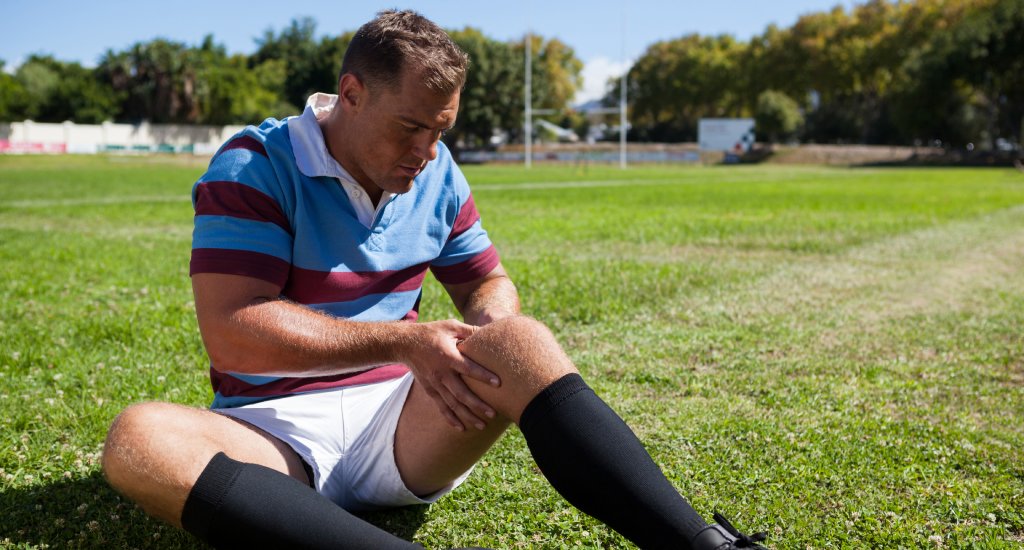Rugby
Common Rugby injuries and how to solve them

Rugby And Sports Injuries
Playing rugby places formidable physical demands on athletes, requiring a unique blend of strength, speed, endurance, and agility. The game involves intense, full-contact situations, including tackles, scrums, and mauls, demanding players to exert force and absorb impact consistently. The continuous and dynamic nature of the sport necessitates high levels of cardiovascular fitness, as players cover significant distances during matches.
Rugby's physicality also emphasizes the importance of muscular strength and power, crucial for effective tackling and ball-carrying. However, these demanding aspects of the sport also contribute to a heightened risk of injuries. Common rugby injuries include sprains, strains, dislocations, and fractures, often resulting from the collisions and high-impact nature of the game. Head injuries, such as concussions, are a particular concern due to the frequency of tackles and collisions.
Rugby players undergo comprehensive training to enhance their physical attributes and reduce injury risks, emphasising proper technique, fitness conditioning, and injury prevention strategies.

Solve Your Rugby Injury Today
Book now with one of our qualified therapists who are ready and waiting to help solve your rugby injury.
Book AppointmentCommon Rugby Injuries
Here are some of the most common rugby injuries we see at the Horsham Sports Injury Clinic
Concussions
Due to the physical nature of the sport, players are susceptible to head injuries, particularly during tackles, collisions, and scrums. Direct blows or sudden impacts can result in concussions.
Shoulder Dislocations
Tackling and contact situations can lead to shoulder dislocations, especially when players are tackled with force or fall awkwardly.
Sprains and Strains
Rapid changes in direction, sudden stops, and the physicality of tackles can cause sprains (ligament injuries) and strains (muscle or tendon injuries) in various parts of the body.
Fractures
High-impact collisions, tackles, or awkward falls can result in bone fractures. Fractures commonly occur in areas such as the collarbone, wrist, or facial bones.
Hamstring Injuries
The explosive and dynamic nature of the game, including sprinting and quick changes in pace, can contribute to hamstring strains.
ACL (Anterior Cruciate Ligament) Injuries
Twisting, sudden changes in direction, and high-impact tackles may lead to ACL injuries, particularly when players pivot or decelerate rapidly.
Ankle Sprains
Sideways movements, uneven playing surfaces, or tackles can cause ankle sprains as players twist or roll their ankles.
Meniscus Tears
Similar to ACL injuries, the meniscus (cartilage in the knee) can be damaged due to sudden changes in direction or forceful impacts.
Hip Injuries
Direct hits or awkward landings during tackles can lead to hip injuries, including contusions, strains, or dislocations.
Back Injuries
The physical demands of scrums and the strain from heavy tackles can contribute to back injuries, including strains or herniated discs.
Rib Injuries
Impact from tackles or collisions, especially in the ribcage area, can result in contusions, strains, or even fractures.
At Home Treatment Options
Here are some at-home exercises that can help prevent rugby injuries
Strength Training
- Bodyweight Squats: Builds strength in the lower body, including the quads and glutes
- Push-Ups: Strengthens the chest, shoulders, and triceps
- Lunges: Targets the legs and enhances balance
- Plank Variations: Engages the core and stabilizes the spine
Dynamic Warm-up
- Jumping jacks
- High knees
- Arm circles
- Leg swings (forward and sideways)
Core Stability
- Russian Twists: Targets the obliques and improves rotational stability
- Superman Exercise: Strengthens the lower back and glutes
- Bicycle Crunches: Engages the entire core
Agility Drills
- Cone Drills: Set up a course with cones for quick changes in direction
- Ladder Drills: Enhances footwork and agility
Plyometric Exercises
- Box Jumps: Builds explosive power in the lower body
- Burpees: Combines strength and cardio, promoting overall fitness
- Jumping Lunges: Strengthens the legs with a plyometric element
Flexibility and Mobility
- Dynamic Stretching: Leg swings, arm circles, and dynamic movements to improve flexibility
- Foam Rolling: Helps with myofascial release and improves mobility
Balance and Proprioception
- Single-Leg Balance Exercises: Stand on one leg for 30 seconds to a minute, then switch legs. Enhances balance and stability
- BOSU Ball Exercises: Utilise a BOSU ball for added balance challenges
Injury-Specific Prevention
- Rotator Cuff Exercises: Incorporate exercises like external rotations to support shoulder stability
- Hamstring Curls: Strengthen the hamstrings to prevent strains
- Ankle Strengthening Exercises: Use resistance bands for ankle stability exercises
Cardiovascular Conditioning
- High-Intensity Interval Training (HIIT): Integrate short bursts of high-intensity exercises with periods of rest to improve cardiovascular fitness
- Burpees: Combines strength and cardio, promoting overall fitness
- Jumping Lunges: Strengthens the legs with a plyometric element
Testimonials
Hear What Our Patients Say



